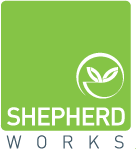Conditions treated
by the Shepherd Works team.
Lactose Intolerance
Normally, lactose is broken down to two smaller sugars, glucose and galactose, by the enzyme lactase. Lactase is produced by the villi that line our small intestine, however the production of lactase can be temporarily decreased by damage to the small intestine, such as the result of a gastro infection. Our production of lactase can also gradually decrease as we get older. In this situation, such people have a lactase insufficiency and therefore permanent lactose intolerance. Most people still produce a small amount of lactase.
Without enough lactase enzyme, the lactose sugar is not digested normally in the small intestine. Instead, it passes to the large intestine where it is fermented by bacteria. This fermentation can cause symptoms such as diarrhoea or loose motions, wind and abdominal bloating and discomfort.
What is Lactose
Lactose is the sugar that is found in milk products from any mammal. It is a double-sugar made up of two smaller sugars (glucose and galactose).
What Can I Eat on a Lactose-Free Diet?
The degree and severity of symptoms depends on the level of lactase insufficiency. If you are still producing some lactase enzyme, you can still continue to include lactose in small amounts in the diet as tolerated. For example, milk in tea and coffee throughout the day may be tolerated; however to drink a full glass of milk would cause symptoms. This is because the body can often be producing very small amounts of the lactase enzyme, however not enough to cope with a large load of lactose at once.
Dietary Therapy
Avoiding dairy products is not the answer to lactose intolerance. Dietary therapy includes:
1. Choosing lactose-free varieties where possible.
2. Lactose intolerance is often dose-related. Therefore having smaller quantities more often over the day may be better tolerated.
For a full description of all of the foods that can be enjoyed on a lactose-free diet, you should consult an Accredited Practising Dietitian who specialises in gastrointestinal nutrition.
Where can I get advice?
For expert dietitian advice, please book an appointment with one of the Shepherd Works dietitians on +613 9890 4911, or click here to submit an appointment enquiry online.
Day time and early evening appointments are available. For people who live interstate, overseas or are unable to make it to one of our practice locations, Shepherd Works offers popular phone & Skype consultation services – please phone +613 9890 4911 or complete the online booking details to arrange.
Where to next?
Shepherd Works Shop
Expand your culinary options with our range of Gluten free and Low FODMAP books... oh and don't forget the treats!
Take me to the shop


